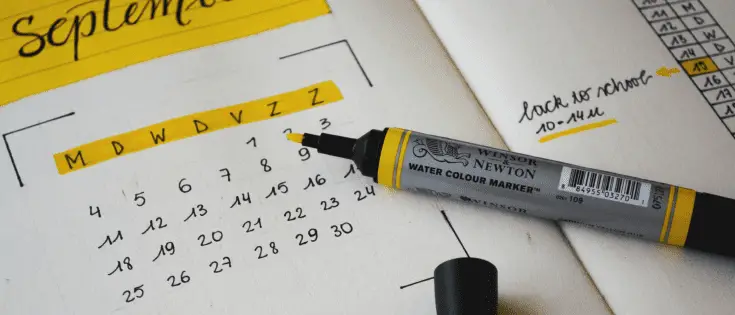It’s a brand new year. Are your finances where you want them to be?
If you’re like me, then you’re probably shaking your head in disappointment.
Instead of setting an impossibly large New Year’s resolution that will haunt you for the rest of the year, let’s start small.
In fact, starting with small goals and building into larger ones is the surest way to achieving your financial goals & dreams.
We can break this into long-term and short-term financial goals. While it’s important to have long term financial goals such as paying off your mortgage and being debt-free, those are lofty goals that will take some time to achieve. If we break those long-term goals into short-term goals, not only will we be making progress on paper but it will also FEEL like we’re making progress.
Here are 11 short-term financial goal examples that you can achieve quickly but will still greatly improve your money situation.
Contents
How to achieve your financial goals
But first, let’s talk about the best way to achieve your financial goals: setting good goals.
If you know what the SMART goal-setting acronym is then you can skip this section, but in-case you forgot, here’s a quick refresher.
Every one of your financial goals should be a SMART goal, that is:
- Specific: Your goal needs to be simple and clear. I like to answer the five “W” questions (what, why, where, which, who) for each of my goals to help with keeping my goal as specific as possible.
- Measurable: Your goal should be quantitative. You need to be able to measure how far away you are from your goal. For example, a goal of “Save for an emergency” is not measurable. The goal: “Save $5000 for my emergency fund” is measurable because you know how far away you are at all times.
- Achievable: Your goal needs to realistic. It should be hard and stretch your ability but not impossible. Only you know what’s realistic for your situation.
- Relevant: Your goal needs to be motivating for you. There needs to be a reason why you’re trying to achieve your goal. To determine if your goal is relevant you can ask yourself the following questions: does this seem worthwhile?
- Time-bound: Every goal needs a deadline. Without some target end date, people will spend years half-heartedly trying to accomplish their goals when they could have achieved it within a few months with some concentrated effort.
To make sure all my financial and non-financial goals are SMART, I like to follow this format:
I will (do, be achieve)_________ by (date)________, I will accomplish this by (taking what action)_________ on a daily/weekly/monthly basis.
This makes sure I set a specific goal with a deadline and establish a routine for accomplishing said goal. Having a SMART financial goal is the best way to ensure that you will achieve it.
11 Examples of Smart Short-Term Financial Goals You Can Crush
These 11 examples are a great way to get the ball rolling towards a healthy financial life. Most of these short-term money goals will actually help you achieve your long-term goals, like retirement.
You don’t have to do all the examples on this list. (If you did, I’d be super impressed though)
Pick your favorite 4 or 5 and try to knock them out before the year is up.

1. Start tracking your net worth
What gets measured gets managed.
Tracking your progress towards retirement is important and fun! Knowing how far you are away from your financial goals is motivating and will keep you on track.
I used to track my progress on a large spreadsheet. But, I spent way too much time every month logging into my different bank accounts and investment accounts and updating the spreadsheet. Eventually, I switched over to Personal Capital.
Personal Capital makes tracking your net worth super easy. You just link your bank accounts, credit cards, and investment accounts and it will give you a real-time net worth update. It’s 100% free too.
I wrote a comprehensive review of Personal Capital you should read if you’re interested.
Right now, if you sign-up for a free Personal Capital account, they’ll give you $20 no-strings-attached.

2. Start saving for those larger purchases
Whether you’re planning on buying your whole family Christmas gifts, or are trying to escape them this holiday season with a Caribbean vacation, you’ll need the money to do so.
Saving up for large purchases keeps us from using our credit cards when we know we shouldn’t. If you can’t pay cash for something like a TV or a small vacation, you probably can’t afford to buy it.
I’ve found that the best way to save for expensive purchases is to create a separate checking or savings account for that goal. This way, you can funnel some money every paycheck into a separate account that you don’t touch until you have enough saved up.
Luckily, just opening a new checking or savings account can help you achieve your goal! There are lots of bank sign-up bonuses these days. Banks want your business, so they incentivize signing up.
For example, you can get up to $350 by opening up a saving or checking account with Chase (and meeting their qualifications).

3. Create a monthly budget and stick to it
Not knowing where your money goes every month is a recipe for disaster.
In fact, learning how to create a budget is usually one of the first steps in any money-management course or book.
Creating a budget will help you figure out where you’re spending too much money, how you can save more money, and whether or not your spending habits are aligned with your personal values.
Making a budget shouldn’t actually take too much time.
1. The first step is to figure out how much you’re spending in each category.
2. Then you decide how much you actually want to spend in that category.
3. Next, you make sure you don’t go over your allotted amount every month.
4. Periodically make alterations to your budget to reflect changes in your lifestyle.
Of course, this is a simplified view of the whole budget creation process. In reality, it’ll take some time to even do the first step.
Here’s a little budget hack: use Mint to quickly figure out where your money goes every month.
Mint is a free tool that allows you to connect your bank accounts and credit cards. Once you connect them, Mint will go through and categorize all your transactions! In minutes, you’ll see exactly how much you spend on groceries, travel, etc. You can even break it down by store (I was uncomfortable with how much I spend at Target…)
This sure beats going through your bank statements by hand.

4. Lower your monthly grocery bill
My grocery bill is one of my largest expenses every month.
I like to eat good food and lots of it. Unfortunately, fresh produce and meat are expensive.
I’ve managed to cut my grocery bill by quite a decent amount with a number of grocery hacks. My favorite of which is Ibotta.
Ibotta is a cash-back app that gives you money back for purchases you make – mostly at grocery stores. It’s easy, here’s how it works:
1. Do your grocery shopping like normal
2. When you check-out, make sure to save your receipt.
3. Within a few days, sit down and check if Ibotta has any deals on the items you purchased (I like doing this while watching Netflix)
4. If you find some deals, redeem your receipt by scanning it with the Ibotta app.
5. Boom! Get cash back and save on your groceries!
Last month, I got $54 in cash-back with Ibotta. That’s nothing to scoff at, especially because I spent no more than 10 minutes looking for deals and uploading my receipts.
Ibotta is currently offering a $10 sign-up bonus when you sign for free and upload your first receipt. So get on it!
Click here to get your $10 sign-up bonus.

5. Eliminate unnecessary monthly subscriptions
The monthly subscription business model has exploded in popularity in recent years.
You can pay a monthly fee to stream movies (Netflix), to read online newspapers (the New York Times), and even to receive razor blades in the mail (Dollar Shave Club).
As someone who likes convenience, I’ve subscribed to way too many monthly subscriptions. I’ve even forgotten about subscriptions that I pay for…
This is where Trim came to the rescue. Trim is a free tool that will go through and list all the monthly and annual subscriptions you pay for. If you want to cancel any, all you have to do is tell Trim to cancel it. They’ll take care of the whole process, which saves you time.
Trim found a newspaper subscription I was still paying $5/month for a state I no longer live in! Talk about throwing money down the drain.
Trim can do other things also, like negotiate some of your monthly utility bills and give you cash back deals on any recent purchases you made.
Sign-up for a free Trim account here.

6. Establish an emergency fund
Not having an emergency fund is a sure-fire way to get into debt.
Whether it’s your car that breaks down at the worst possible time or your company decides to do a round of layoffs, stuff happens. You need to be prepared for those situations so that you don’t have to get into debt to keep your lifestyle.
The best way to be prepared is to have a 6-month emergency fund. That means, having enough money put away in a savings account that will cover 6 months of normal living expenses. (Remember, have a separate savings or checking account for your emergency fund so you’re less likely to spend it)
If you’re just starting to create your emergency fund, first aim for $1000. Then 3 months of living expenses. Eventually, make sure to hit 6 months.
Why 6 months of expenses? Six months should be plenty of time to find a new job if you or your partner was suddenly laid off.
Don’t be caught with your pants down, create an emergency fund.

7. Start contributing to your 401k (or IRA)
If you’re not yet socking money away for your retirement, then put that first on your priority list.
The sooner you start investing your money, the faster it can start working for you. Compound interest will make you rich if you give it enough time.
The best place to start investing is your company’s 401k. If you’re lucky, your company will even provide a 401k company match. Which means they’ll match your contributions up to a certain amount. That’s the closest thing to free money you’ll ever get!
Ask your HR department how to set-up your 401k contributions.
If you’re like me and your company doesn’t offer a 401k (with a match), then you’ll have to take your money elsewhere.
I suggest opening an IRA (Individual Retirement Account). There are many different brokers where you can open an IRA account, however, Vanguard is my favorite. They have some of the lowest fees in the industry.
Here’s an article on how to open an IRA account at Vanguard to get you started.

8. Start a second income stream
The best way to save more money is to make more money!
Building multiple income streams is one of the best ways to become financially independent. Having a second income stream is also great in case you lose your job. That way you still have some sort of income. Even if it doesn’t cover all your monthly expenses, it will make your emergency fund last a lot longer.
Who knows, maybe your side income will eventually become your main source of income and you can quit your job for good!
So whether you’re looking to just make a few extra dollars or month or to grow your own business, start your journey this year. Set a concrete goal on how much extra money you want to make and hit it.
Here are some ideas for a second income stream to get you started.

9. Increase your income by asking for a raise
Asking for a raise is a great way to immediately increase your income without having to do any extra work.
If you’re like me, then just the thought of asking your boss for more money gets your heart-rate going.
Most of us consider asking for a raise as an uncomfortable and awkward conversation. But it shouldn’t be. Asking for a raise is a very normal thing to do.
If you haven’t received a bump in your salary in over a year, then it’s probably time to ask for a raise – at least just to stay even with inflation. Obviously, it helps if you’re amazing at your job. 😉
Here’s a great guide on how to ask for a raise.

10. Check your credit report for errors
Did you know that it’s possible that your credit report has inaccurate information on it?
False information on your credit report can negatively affect your credit score and therefore your ability to get a house, a new car, and your chances of obtaining lines of credit in the future.
In fact, the FTC claims that 1 in 5 Americans has inaccuracies on their credit reports. You want to dispute the inaccurate claims as soon as possible, so you can boost your credit score.
The best part is that you can obtain your credit report from all three credit bureaus for free, once a year.
All you have to do is use the FTC-approved website annualcreditreport.com, and you can see your credit report online instantly.
Once you check your report for errors, here’s how to dispute any errors on your credit report.

11. Make extra payments towards your home’s mortgage
Compound interest works magic for you when you’re investing your own money. But it destroys you when you’re borrowing someone else money – like your home mortgage.
Making extra payments towards your home mortgage can save you thousands of dollars in interest throughout the length of the loan. It’ll save you even more if you have mortgage insurance (PMI) and you make extra payments to reach 20% equity sooner.
Use this calculator to see how much money you could save if you made extra payments towards your mortgage.
For example, on a $350,000 home loan at 4.652% APR, if you made an extra $50 a month payment you would save $19,422 in interest!
Bump that monthly payment to an extra $200 and you’ll save $64,000!
12. Buy A Rental Property:

This is one of the most effective methods if you want to set your short term financial goals.
This one is also a favorite method of many for building wealth and no extra effort is a need in this one.
This is far from the easiest and quickest method of passive income. You just need to invest little and sometimes no money.
Searching for good and trustworthy tenants is the only job that needs effort, once you find them then you are easy to go.
This financial goal is both short term and long term according to your need.
13. Max Out Your Retirement Support:
Maxing out retirement support is a key method to a wealthy future. Plus by contributing most in retirement support helps you to get your money out of interest.
Contributing to traditional (401k) is an intelligent choice and there are many reasons behind it, one of the most common ones is that it is tax-deductible.
That means you do not need to pay taxes until you make the withdrawal. The key is to put in the most if you want more dividends and appreciation.
By the time you reach your 60’s, you have a handsome amount of saving incase you start saving it from now.14. Calculate Your Saving Rates:
Understanding your saving rates is as important as tracking your monthly salary.
If you want to save more and more money then it is the key tool for both if you are saving for retirement or want to achieve your independence goal.
Your saving rates tell you how much you are saving from the total income you get.
So if your income is $10,000 and you are saving $1000 then your saving rate is 10%.
If the average rate of your saving is 8.8%, irrespective of your income then it takes almost 54 years to retire.
The good thing is the clock doesn’t start ticking if you don’t start saving so calculate the rate and start saving.
15. Payoff Your Smallest Debt:

The thing I am going to say is not controversial at all; no one wants to keep the credit card debt if it is no use.
I have heard from quite a lot of people that these credit card debts help them in increasing the card score.
People are also inspired by this thing that they offer you a 0% balance transfer. Let me tell you,
Don’t do it, I am telling you don’t do it.
It only helps you in ruining your wealth, it is just like toe over the line. And it should be a piece of good advice to work on that bad things are good to eliminate.
There are different ways of prioritizing your debt but the most effective one is the pay off the smallest one.
16. Review Your Balance Account And Rebalance:
This is another important short term financial goal that you need to set this year, and
Do you know what is a good point?
This goal is easier to achieve than you think. In particular employer retirement accounts seems more formidable than they need to be.
Do you remember?
That you filled a form when you were filling the form for new hiring orientation and check the box that you want a retirement plan at 65 years.
This is a check it and forget it game. But do you know where you are investing in real? And what about the management fees?
All these questions need to be answered.
Firstly, you need to look at how can you maximize your retirement savings. Then review how you invested? And figure out what is the management fees.
17. No Spend Challenge For Month:

If you think that your spending is increasing day by day and now month after month.
Then this short term financial goal will also go to help you. A no-spend month challenge will go to help you in many ways. But most importantly it will be a great ticket to your finance improvement.
By doing this you will learn about in fact you will learn a lot about your tendencies to spending money.
Especially, this will help you when you have no habit of keeping the track of your finance and spending money when there is a need for spending it.
18. Declutter:
Some stuff belongs to us but is of no use, such as some antiques and old furniture. The thing is you can not through it out just by the way.
So for this, I have an idea for you that is also a short term financial goal. Have a yard sale. That will help you in raising your wealth.
We all think that there is no one to buy our old furniture and other stuff but we all are wrong. If no one buys them then eBay will always here to buy them.
As far as your old stuff is well maintained or in other words they are in good shape someone is going to buy them.
You can also put your old stuff online, and you will be amazed by the responses and the amount they will give you for your old stuff.
19. Check Your Insurance Premium:

The coverage of your insurance changes every year. So, you need to look at and revise them every year. Keep a check on the insurance because they increase every year without giving a reason.
It is another short term financial goal that you need to set this year and make sure that you take care of this one throughout your career.
20. Say No To Over Spending:
The trip to your favorite place can wait so does the retail therapy. You don’t need to put a lot and a lot of money on online stuff.
You can cook at home and enjoy a healthy meal, your financial dreams cannot be achieved until you go with the plan.
Until you don’t stop spending bucks after bucks on unnecessary things you would not bring your financial plan in power.
What Is A Short Term Goal?

If you are feeling like you are losing momentum at the very beginning of your career. Or it seems difficult for you to achieve the goal then you need to set the short-term goals.
But, What are These Short Term Goals?
You surely want to achieve many goals in your business or personal life but the catch is that you can’t achieve them into smaller ones.
Each smaller goal takes you close to your destination. Long term goals are also valuable but you know they are long term.
Why Don’t we Break Them Into Smaller Ones?
There are many advantages of working on short term goals. One of the most effective ones is that it brings you quick feedback.
Getting feedback whether it is positive or negative is compulsory because it helps you in keeping the motivation.
Also,
These short term goals also help you in making effective strategies through which you can easily achieve your goals.
Hands in hands,
The short term goals also help us in keeping the focus on our work cause some times achievement of long term goals seems unrealistic.
What Is A Short Term Goal?
The thing is you can’t really go anywhere until you are aware of where you are currently. When it comes to setting up short-term goals then this thing is highly applicable.
You know how?
Until you don’t know what your financial state is, you would not be able to set up the goals.
Am I right?
So the first and most important short term Financial goal the must stand first is making of budget.
This is an easy way to track where your money is going. There are many ways of making a budget. You can make it through the traditional way by collecting bank scripts etc., or you can make it through the modernizing method.
Making of budget helps you in the completion of many other short term financial goals.
Short-Term Money Goals Wrap-up:
There you go, a quick list of financial goals you can crush before the year is up.
Remember, don’t overwhelm yourself with taking on everything that was mentioned above. Choose a few to prioritize and get the ball rolling. Good luck!
What short-term financial goals are you aiming for? I’d love to hear about them in the comments below.

For less than 5 minutes of your time, earn yourself a random stock whose value is anywhere between $5.00 and $200. It is possible through an investing app called Robinhood.